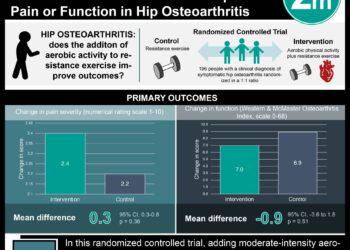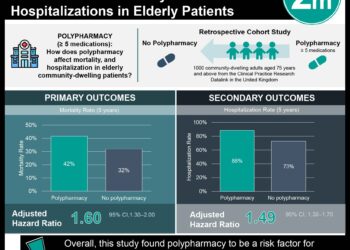Wellness Check: Exercise
2 Minute Medicine is pleased to announce that we are launching Wellness Check, a new series dedicated to exploring new research evidence focused on wellness. Each week, we will report on articles examining different aspects of wellness, including (but not limited to) nutrition, sleep, reproductive health, substance use and mental health. This week, we explore the latest evidence-based updates in exercise.
Increased physical activity is a long-term protective factor for dementia
1. Physical activity was significantly associated with a decreased incidence of all-cause dementia and Alzheimer’s disease, irrespective of follow-up length, baseline age and study quality.
2. Physical activity was found to be a protective factor for all-cause dementia and Alzheimer’s disease, even in follow-ups longer than 20 years.
Evidence Rating Level: 1 (Excellent)
Physical activity (PA) is an important modifiable risk factor in the prevention and incidence of dementia. Although many meta-analyses have previously investigated this relationship, they have often lacked rigorous quality assessments or have short follow-up times. As a result, the present systematic review and meta-analysis examines the influence of mid-life PA as a protective factor of all-cause dementia, Alzheimer’s disease and vascular dementia.
From 16,324 identified articles, 58 articles were included (n=257 983) from database inception to October 2021. Studies were included if they had a baseline measure of PA and a follow-up longer than 1 year. Studies were excluded if participants had a specific disease at baseline or had established mild cognitive impairment/dementia at baseline. Quality assessment was performed using a tool that authors developed specifically for the present study. Statistical analyses were performed using pooled effect sizes, dose-response analysis and funnel plots.
Results demonstrated that physical activity was significantly associated with a decreased incidence of all-cause dementia and Alzheimer’s disease, irrespective of follow-up length, baseline age, and study quality. Furthermore, physical activity was found to be a protective factor for all-cause dementia and Alzheimer’s disease, even in follow-ups longer than 20 years. However. the study was limited by the lack of high-quality studies and the limited reports of vascular dementia as an outcome. Nonetheless, the present study provides a unique contribution to the literature by demonstrating a significant association between PA and dementia during longer follow-ups than earlier analyses.
High physical activity may have a role in increasing coronary artery calcification
1. Participants in the high physical activity trajectory group had a higher risk of coronary artery calcification progression compared to those in the low physical activity trajectory group after adjusting for traditional cardiovascular risk factors.
2. The high physical activity trajectory group was not associated with an increased risk of incident cardiovascular events.
Evidence Rating Level: 2 (Good)
Recent evidence demonstrates that there may be a threshold beyond which the cardiovascular benefits of physical activity (PA) are lost. Furthermore, prior studies have not explored the relationship of PA trajectories from young adulthood onwards with respect to coronary artery calcification (CAC) and the development of cardiovascular disease (CVD) later in life. As a result, the aim of the present study was to describe longitudinal changes in PA levels over a 25-year span among individuals free of CVD and evaluate subsequent CAC progression and incident CVD events.
From 1985-1986, 2497 participants (aged 18-30) were included from the Coronary Artery Risk Development in Young Adults (CARDIA) study. All study participants were included at year 15. Participants were excluded if they had missing baseline CAC data or had missing covariates of interest. PA levels were examined between years 0 and 25 through a self-reported questionnaire. CAC was measured at years 15, 20 and 25. Long term PA trajectories (low, moderate, high) were determined by latent class modelling.
The results demonstrated that participants in the high physical activity (PA) trajectory group had a higher risk of coronary artery calcification (CAC) progression compared to those in the low PA trajectory group. The high PA trajectory group did not have an increased risk of incident CVD events. However, the study was limited by the relatively low number of total participants and incident CVD events in the high PA group, which may affect the results. Nonetheless, the study design allowed for a unique opportunity to examine the association between PA in early adulthood and CVD outcomes in midlife.
Increases in muscle-strengthening activities may reduce mortality risk and certain diseases
1. Muscle-strengthening activities (MSA) were associated with a lower risk of cardiovascular disease (CVD), total cancer, diabetes, lung cancer and all-cause mortality, independent of aerobic activities.
2. The maximum risk reduction was obtained at around 30-60 minutes/week.
Evidence Rating Level: 2 (Good)
The recent World Health Organization guidelines recommend that adults should perform MSA at least 2 days per week. Compared with aerobic activities, MSA has not been investigated as frequently in terms of its influence on preventing premature death and non-communicable diseases (NCDs). As a result, the purpose of the present systematic review and meta-analysis of prospective cohort studies was to investigate the association of MSA on the risk of mortality and NCDs among adults.
From 1252 identified records, 29 studies (n = 263,058 participants) were included from database inception to October 2020. Eligible studies had a prospective observational design of adults and examined the influence of MSA on any health outcome. Studies were excluded if participants had severe baseline health conditions (e.g. cancer or disability). Study quality was assessed using a modification of the Newcastle-Ottawa Scale (NOS) for Quality Assessment of Prospective Cohort Studies. A dose-response meta-analysis was used to investigate the influence of MSA on health outcomes.
Results demonstrated that MSA were associated with a lower risk of CVD, total cancer, diabetes, lung cancer and all-cause mortality independent of aerobic activities. Furthermore, the maximum risk reduction was obtained at around 30-60 minutes/week. However, the study was limited by the small number of included studies which precluded the ability to perform subgroup analyses. Despite this, the present study suggests that performing MSA may provide benefit in reducing the risk of NCDs independent of aerobic activity.
Exercise interventions are currently being poorly reported in the literature
1. In this overview of systematic reviews, characteristics of exercise interventions such as “when”, “how much” as well as detailed descriptions were poorly reported across a range of studies.
2. Furthermore, the quality of systematic reviews included in this study ranged from critically low to moderate in quality.
Evidence Rating Level: 2 (Good)
Compared with trials of medicines, the methodologies of exercise trials tend to be poorly reported. Tools such as the Consensus on Exercise reporting Template (CERT) and the Template for Intervention Description and Replication (TIDieR) were developed to improve poor reporting. Though many systematic reviews have investigated the quality of reporting of exercise interventions, these have not yet been synthesized. As a result, the aim of the present systematic review is to determine how well exercise interventions have been reported in the literature.
From 7804 identified records, 28 systematic reviews (1467 studies comprising 1724 interventions) were included from database inception up to July 2021. Studies were included if they primarily assessed the quality of exercise intervention reporting using either the CERT or TIDieR tools. Review quality was assessed using a modified version of A Measurement Tool to Assess systematic Reviews (AMSTAR 2). Data was synthesized using simple descriptive statistics for each item of each relevant tool.
The results demonstrated that characteristics of exercise interventions described using CERT or TIDieR (such as “when”, “how much” as well as detailed descriptions) were poorly reported across a range of studies. Furthermore, the quality of systematic reviews ranged from critically low to moderate in quality. However, the study was limited by the fact that the authors chose to only include data extracted from the main articles and supplemental materials, rather than actively seeking out protocols or contacting trial authors which may have impacted the completeness of the reporting. Nonetheless, the present study sheds light on the need for high quality reporting in order to improve translation in clinical settings.
Image: PD
©2022 2 Minute Medicine, Inc. All rights reserved. No works may be reproduced without expressed written consent from 2 Minute Medicine, Inc. Inquire about licensing here. No article should be construed as medical advice and is not intended as such by the authors or by 2 Minute Medicine, Inc.







